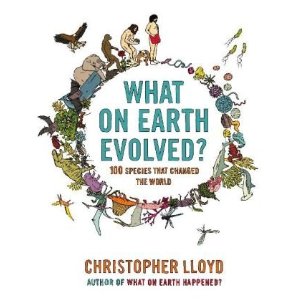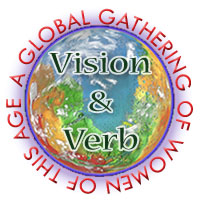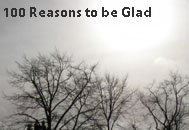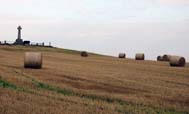…100 species that changed the world…
 Synopsis (from book cover):
Synopsis (from book cover):
Why have creatures evolved as they are? which species have had the biggest impact on the world we live in? Where does humanity fit in?
Christopher Lloyd leads us on an exhilarating journey, from the birth of life on the early Earth to the present day, as he seeks answers to these fundamental questions. Along the way he reveals the extraordinary stories of the fifty most successful species that have evolved in the wild – such as slime, sea scorpions, dragonflies and dung beetles – followed by fifty species that have thrived as a result of man’s interference – from dogs, cats and camels to yeast, coffee and bananas.
The 100, species are finally scored and ranked in order of their impact on the planet, life and people. Which species comes top? How do life forms adapt to a world dominated by nearly 7 billion humans? What on earth evolved? exposes the struggle between the forces of nature and the mind of mankind for control of life, and the earth itself.
Review:
What on Earth Evolved? is the follow on volume from What on Earth Happened?, you can see my review of the first book here.
The book takes a unique approach to science, history, geography and nature by looking at 50 species that evolved in the wild without intervention and 50 species that have thrived due to man’s intervention. All types of species from large to small are included such as – algae, virus, fish, plants, animals and insects.
The book which is full of interesting and surprising facts is accessible and educational and will appeal to both the young and the old. The aim is to give an enriched understanding of history through the eye of the natural world and I think it achieves this aim. I found it very readable from cover to cover, but it is also a book you can just dip into or refer back to using the index and chapter headings. Most pages have colour illustrations which for me added to the enjoyment of the book.
The final part of the book where it lists the rank of impact of the 100 species chosen into a table of influence is designed to stimulate thought and debate. I can imagine sitting up late into the night with my friends discussing some of the species included in the book. One such topic may be the how the export of roses from the heart of Kenya has reduced a lakes’ water level 3 meters below minimum safety levels. Water accounts for 90% of a cut flower and these roses are being exported from one of the driest places on the planet to the worlds wettest countries in Europe.
I was lucky enough to be able to attend the fascinating lecture that launched the book, you can see my review of the launch here.
More information can be found on the book’s dedicated website, where you can also access the list of the 100 species ranked in order.
Note: The review is based on the hardback version, an abridged paperback version has recently been published.








Y-e-e-e-s-s-s-s, the jury’s out, of course, on evolution as presented in its dogmatic form, i.e. as a done deal.
The book doesn’t present it in a dogmatic form. As I mentioned in the review it takes a unique approach. The whole idea is supposed to stimulate thought and debate. There were some very good ones at the lecture itself and as I mentioned I will probably end up sitting up half the night discussing the book with friends as I did with the first book.
Sounds like an interesting read akthough I hardly think any jury is really out about evolution (except creationists/IDers)
I think you would really enjoy the book and the one that came before it. They both contain lots of fascinating facts.
you should also read this book
http://www.amazon.co.uk/Why-Us-Science-Rediscovered-Ourselves/dp/0007120281/ref=sr_1_1?ie=UTF8&s=books&qid=1282200981&sr=8-1-spell
That sounds interesting too, I haven’t heard of that one before.
You do post up some interesting ones, I get the idea I would love this one :0
I think you would like the book, it gives lots of interesting facts about the different species that are listed. All though it mentions evolution in the title the book is really about the impact of different species on the planet and each other.
It’s certainly a great title.
It is a very interesting book
I do have a problem with quite common statements like… “by looking at 50 species that evolved in the wild without intervention and 50 species that have thrived due to man’s intervention.” because “man’s intervention” is as natural as the intervention by all sorts of other species in the selected 50 that supposedly evolved “without intervention”. ALL species eveolve through constant intervention with one another. “Man’s intervention” is just another example of natural processes at work, because everything man does is natural – it is just Man behaving naturally. We ARE ourselves “in the wild”, because our technology etc is just part of what humans in the wild eventually do. But of course, I know what is meant by the distinction, but the artificial attempt to label things that one selected species (ie Man) does to others as somehow unatural is not good thinking. I also don’t like our species being called “Man”, by the way, but since you are a woman and you used it without complaint I’ll let than one pass (almost
I think the biggest distinction between the two sections is not that it is unnatural for humans to intervene, more that it can be done on a bigger scale with wider impact due to technology. Another thing that stands out is that some of the things that humans do are purely for pleasure whereas (most) other species actions are for survival.
Well I tried human instead of man but it still has ‘man’ so maybe I should revert to Homo Sapiens but there again that is a bit of a mouthful… Oh see how easily confused I get
Yeah but woman has “man” in it too, so the general “human” becomes, more specifically “woman” easy enough (she who brings woe?), and human also becomes “man” when a bit of human (?or a bit of humanity?) is left out, which matches the genetics of the male-creating chromosome which is a stunted relic of a female one (with all the nonsense removed, or all the culture and sensitivity removed, whatever is your bias!).
So where does that leave us with describing the species (and the male/female of said species) that is Homo Sapiens without getting bogged down with the finer details of language or inappropriate labelling?
It is open to interpretation but does the “woman” bring “woe” or “woo”? Just a thought
another book that might help you understand the evolution of mankind (or it might just confound the issue with his flip style of writing)
http://www.amazon.com/dp/1557788367?tag=onecosmos-20&camp=14573&creative=327641&linkCode=as1&creativeASIN=1557788367&adid=0F9AM46BX2K9JZ6K61QX&
The review on this one does flip my mind, I don’t understand what it is trying to say…
But moving on from that – during my childhood I was taught Christian teachings and then taught Darwin teachings. I understood both, then one day the teacher of Darwin said something quite inappropriate as a school teacher.
This lead me down the path of exploration and the conclusion I came to was that the divine being (whatever that means) and the various religions are not incompatible with evolution.
All these things lead to the same thing, but it is difficult for people to see.